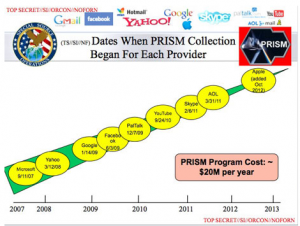[youtube]QwiUVUJmGjs[/youtube]
For a guy who warned for years about an abuse of the FISA Amendments Act and Section 215 of the PATRIOT Act, I have to admit Ron Wyden was pretty circumspect yesterday. He issued a statement, partly to reiterate his call to make this public, partly to suggest the program isn’t worth much.
The administration has an obligation to give a substantive and timely response to the American people and I hope this story will force a real debate about the government’s domestic surveillance authorities. The American people have a right to know whether their government thinks that the sweeping, dragnet surveillance that has been alleged in this story is allowed under the law and whether it is actually being conducted. Furthermore, they have a right to know whether the program that has been described is actually of value in preventing attacks. Based on several years of oversight, I believe that its value and effectiveness remain unclear.
And he sent out three tweets:
Of course, it’s the second tweet — showing the Director of National Intelligence lying in testimony to Congress about whether the NSA collects “any data at all on millions or hundreds of millions of Americans” — I found most interesting.
Wyden always has had a knack for exposing people as liars.
By the end of the day the National Journal had contacted Clapper to provide him an opportunity to explain why this lie to Congress wasn’t a lie. He offered a nonsensical explanation.
Director of National Intelligence James Clapper said Thursday that he stood by what he told Sen. Ron Wyden, D-Ore., in March when he said that the National Security Agency does not “wittingly” collect data on millions of Americans.
“What I said was, the NSA does not voyeuristically pore through U.S. citizens’ e-mails. I stand by that,” Clapper told National Journal in a telephone interview.
On March 12, at a hearing of the Senate Intelligence Committee, Wyden asked Clapper: “Does the NSA collect any type of data at all on millions or hundreds of millions of Americans?” Clapper responded: “No, sir.” When Wyden followed up by asking, “It does not?” Clapper said: “Not wittingly. There are cases where they could, inadvertently perhaps, collect—but not wittingly.” Clapper did not specify at the time that he was referring to e-mail. [my emphasis]
Clapper’s lie — that he took Wyden’s “collected any type of data at all” to mean “voyeuristically pore through emails” — is all the worse for how bad a non-sequitur it is. Caught in a lie, the head of our Intelligence Community responded with word salad.
Given that abysmal attempt to explain away his lie, I find it all the more curious the Administration decided Clapper, newly exposed as a liar, would be the guy to head pushback to the revelations of the last few days. Late in the day Clapper issued first one, then another “statement” on the revelations.
Both, of course, issued stern condemnations of leaks revealing that he had lied (and that Americans have no privacy).
The unauthorized disclosure of a top secret U.S. court document threatens potentially long-lasting and irreversible harm to our ability to identify and respond to the many threats facing our nation.
[snip]
The unauthorized disclosure of information about this important and entirely legal program is reprehensible and risks important protections for the security of Americans.
Those are hollow warnings, of course, for the reasons I laid out here.
Clapper then goes on to claim that both stories misrepresent the programs.
The article omits key information regarding how a classified intelligence collection program is used to prevent terrorist attacks and the numerous safeguards that protect privacy and civil liberties.
[snip]
The Guardian and The Washington Post articles refer to collection of communications pursuant to Section 702 of the Foreign Intelligence Surveillance Act. They contain numerous inaccuracies.
Worlds tiniest violin! After refusing urgent requests from members of Congress who had been briefed on this to be transparent for years, the Intelligence Community has lost its ability to spin this!
Perhaps the most interesting part of Clapper’s two statements, however, is the way Clapper purportedly clarified a detail about the WaPo/Guardian stories on PRISM.
Clapper — and an anonymous statement from a Senior Administration Official issued minutes before Clapper’s — made explicitly clear PRISM operates under Section 702 of the FISA Amendments Act.
Section 702 is a provision of FISA that is designed to facilitate the acquisition of foreign intelligence information concerning non-U.S. persons located outside the United States. It cannot be used to intentionally target any U.S. citizen, any other U.S. person, or anyone located within the United States.
Activities authorized by Section 702 are subject to oversight by the Foreign Intelligence Surveillance Court, the Executive Branch, and Congress. They involve extensive procedures, specifically approved by the court, to ensure that only non-U.S. persons outside the U.S. are targeted, and that minimize the acquisition, retention and dissemination of incidentally acquired information about U.S. persons.
Section 702 was recently reauthorized by Congress after extensive hearings and debate.
Section 702, Section 702, Section 702.
This claim had only been implicit in the reporting in the WaPo and Guardian.
Read more →

![[photo: liebeslakritze via Flickr]](http://www.emptywheel.net/wp-content/uploads/2013/06/SpyGrafitti_liebeslakritze-Flickr_300pxw.jpg)

